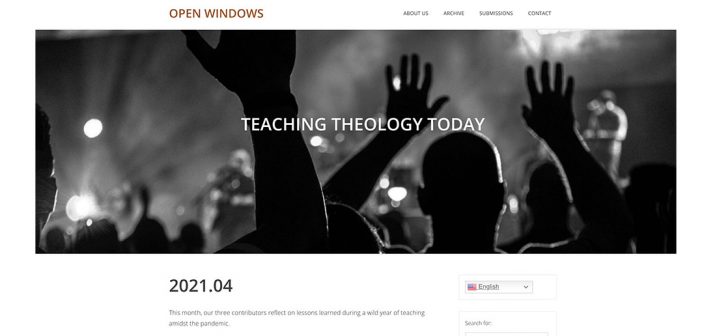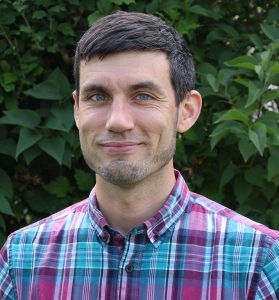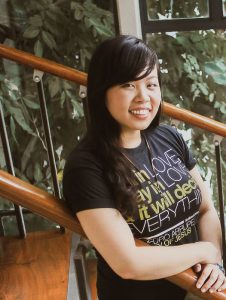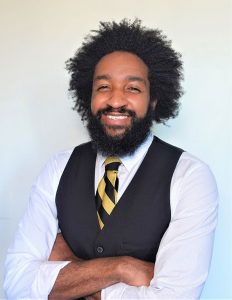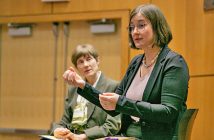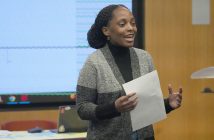What do Black Lives Matter, remote learning, and international students have to do with theology?
Quite a bit, according to a group of five theology graduate students. The topics made their way into a new online platform they launched this spring called Open Windows, where articles examined the intersecting issues of our time. The new initiative is geared toward both exploring the pedagogy and possibilities of the field of theology.
The platform is a hybrid between an academic journal and a blog. It was founded by Fordham students Matthew Charles, James Dechant, and Stephanie Ann Puen, who serve as managing editors, and Lisa Radakovich Holsberg and C.A. Chase, who are contributing editors. Charles, Dechant, and Chase are current Ph.D. candidates, while Puen and Holsberg earned their doctorates this spring from the Graduate School of Arts and Sciences.
Where the Professional and Personal Meet
In published pieces, students and contributors explored areas where their professional and personal interests intersected. In “Flying in a Pandemic,” for instance, Puen related the odyssey of traveling from the Philippines to the United States last March, and how it gave her a better appreciation for flexibility that teachers should necessary. Doctoral candidate and teaching fellow J.K. Melton, in “The Inbreaking of Grace through the Gaps of Asynchronous Learning,” made the case that teaching remotely, as he had even before the pandemic hit, taught him the ability to recognize moments of grace.
Dechant said the journal was borne out of a professional development meeting last May, where the idea of a blog about teaching was broached.
“One of the things that’s distinct about Fordham’s graduate programs, including theology, is that by the time you finish your Ph.D., you will have probably taught for three years or more, and not just as assistant, but as an actual teacher running your own class,” he said.
“Open Windows was a way to have a platform to share that experience of teaching, not only amongst ourselves but also with the larger graduate school community.”
The first issue, which featured four essays, was published in March at openwindows.ace.fordham.edu; a second one came out in April with three essays. In choosing what they solicit and publish, the editors are careful not to include pieces that are exclusively about pedagogy.
“Somebody who doesn’t teach and does theology can still get things out of it, and somebody who doesn’t do theology and does teach can get something out of it,” Dechant said.
Puen, a native of the Philippines who came to Fordham with degrees in management engineering and theological studies from Ateneo de Manila University, said overseeing Open Windows complimented her work, which is focused on theological ethics.
“I always want to look out for concrete tools, not just experiments, but stuff people can use in the classroom, such as ways to evaluate students,” she said.
“We also want pieces that help people reimagine or rethink what it means to be a teacher.”
Connecting Theology to Everyday Life
Charles, who wrote “Teaching in the Wake,” an essay in the inaugural issue that touched on issues raised in the aftermath of the murder of George Floyd, said there is a movement afoot to better connect theology to the reality of students’ everyday lives.
“I’m not just talking about engaging with other formal religious traditions, but popular culture and other ways of knowing and affirming of the self that don’t align with what we see in theology,” he said.
“I tell my students we’re all theologians. We all operate in God’s eye, and whether we affirm a God, there is some way we’re talking about the ‘more to us’ that lacks words. I think that’s where theology is going.”
Although the pandemic delayed the launch of Open Windows, the editors are optimistic that it will find both contributors and an audience, since the open-ended nature of the publication—they’re open to audio and visual contributions—makes it an attractive place for graduate students to take their work to a larger audience.
“This allows us to practice speaking in another register that’s between the academic writing—that we do all the time that we care deeply about—and popular publishing,” Dechant said.
“You’re still using some academic terms and engaging these issues but doing so in an accessible way. Theology needs to go beyond its borders and speak to a wider audience.”
